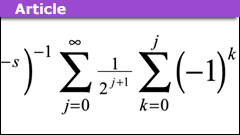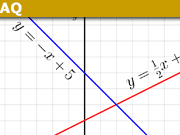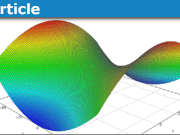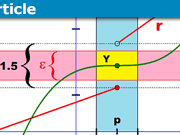The Analytic Continuation of the Lerch and the Zeta Functions
Table of Contents
Introduction
In this brief Insight article the analytic continuations of the Lerch Transcendent and Riemann Zeta Functions are achieved via the Euler’s Series Transformation (zeta) and a generalization thereof, the E-process (Lerch). Dirichlet Series is mentioned as a steppingstone. The continuations are given but not shown to be convergent by any means, though if you the reader would be interested in such write me in the comments and I may oblige with an update if I get around to it. Some basic complex analysis and (double) series manipulations are the only assumed knowledge herein.
Euler’s Series Transformation and the E-Process
We wish to consider the supposed convergent alternating series ##\sum\limits_{k = 1}^\infty {{{\left( { – 1} \right)}^{k – 1}}{a_k}} ## by use of the power series
$$f\left( x \right) = \sum\limits_{k = 1}^\infty {{{\left( { – 1} \right)}^{k – 1}}{a_k}} {x^k}\text{ (1.1) }$$
Which we require to converge for at least ## – 1 < x \leq 1## . That we may effect the change of variable [cf. Knopp pg. 469]
$$x = \frac{y}{{1 – y}}\text{ (1.2) }$$
In (1.1), the following calculations are useful: recall that
$$\frac{{{d^k}}}{{d{y^k}}}{y^j} = \frac{{j!}}{{\left( {j – k} \right)!}}{y^{j – k}}\text{ (1.3)}$$
holds for integer ##k \leq j,j \in {\mathbb{Z}^ + }##, also note that under the change of variables (1.2), we have
\begin{gathered} {x^k} = {\left( {\tfrac{y}{{1 – y}}} \right)^k} = {y^k}{\left( {\tfrac{1}{{1 – y}}} \right)^k} = \tfrac{{{y^k}}}{{\left( {k – 1} \right)!}} \cdot \tfrac{{{d^{k – 1}}}}{{d{y^{k – 1}}}}\left( {\tfrac{1}{{1 – y}}} \right) = \tfrac{{{y^k}}}{{\left( {k – 1} \right)!}} \cdot \tfrac{{{d^{k – 1}}}}{{d{y^{k – 1}}}}\left( {\sum\limits_{j = 0}^\infty {{y^j}} } \right) \\ = \tfrac{{{y^k}}}{{\left( {k – 1} \right)!}}\sum\limits_{j = k – 1}^\infty {\tfrac{{j!}}{{\left( {j – k + 1} \right)!}}{y^{j – k + 1}}} = \sum\limits_{j = k – 1}^\infty {\left( {\begin{array}{*{20}{c}} j \\ {k – 1} \end{array}} \right){y^{j + 1}}} \\ \end{gathered}
where it is required that ##\left| y \right| < 1## for convergence so that (1.1) becomes
\begin{gathered} f\left( {\tfrac{y}{{1 – y}}} \right) = \sum\limits_{k = 1}^\infty {{{\left( { – 1} \right)}^{k – 1}}{a_k}{{\left( {\tfrac{y}{{1 – y}}} \right)}^k}} = \sum\limits_{k = 1}^\infty {{{\left( { – 1} \right)}^{k – 1}}{a_k}\sum\limits_{j = k – 1}^\infty {\left( {\begin{array}{*{20}{c}} j \\ {k – 1} \end{array}} \right){y^{j + 1}}} } \\ = \sum\limits_{k = 0}^\infty {\sum\limits_{j = k}^\infty {{{\left( { – 1} \right)}^k}\left( {\begin{array}{*{20}{c}} j \\ k \end{array}} \right){a_{k + 1}}{y^{j + 1}}} } = \sum\limits_{j = 0}^\infty {{y^{j + 1}}\sum\limits_{k = 0}^j {{{\left( { – 1} \right)}^k}\left( {\begin{array}{*{20}{c}} j \\ k \end{array}} \right){a_{k + 1}}} } \\ \end{gathered}
By (1.2), we have ##x = 1## when ##y = \tfrac{1}{2}##, and considering ##f\left( 1 \right) ## gives Euler’s Series Transformation, namely
$$\boxed{\sum\limits_{k = 1}^\infty {{{\left( { – 1} \right)}^{k – 1}}{a_k}} = \sum\limits_{j = 0}^\infty {\tfrac{1}{{{2^{j + 1}}}}\sum\limits_{k = 0}^j {{{\left( { – 1} \right)}^k}\left( {\begin{array}{*{20}{c}} j \\ k \end{array}} \right){a_{k + 1}}} } }\text{ (1.4)}$$
Note that Knopp makes judicious use of the forward difference operator notation in this context, not reproduced herein.
A generalization of Euler’s Series Transformation is the E-Process (short for Euler Process) is derived similar to the Euler’s Series Transformation by considering slight alterations of (1.1) and (1.2). Consider now the function defined by formal power series
$$g\left( x \right) = \sum\limits_{k = 1}^\infty {{a_k}{x^k}}\text{ (1.5)}$$
which is supposed to converge for at least ## – 1 < x \leq 1##. For fixed ##q##, propose the change of variables
$$x = \frac{y}{{1 – qy}}\text{ (1.6)}$$
under which, and utilizing (1.3), we have
\begin{gathered} {x^k} = {\left( {\tfrac{y}{{1 – qy}}} \right)^k} = {y^k}\tfrac{1}{{{{\left( {1 – qy} \right)}^k}}} = \tfrac{{{y^k}}}{{\left( {k – 1} \right)!{q^{k – 1}}}} \cdot \tfrac{{{d^{k – 1}}}}{{d{y^{k – 1}}}}\left( {\tfrac{1}{{1 – qy}}} \right) = \tfrac{{{y^k}}}{{\left( {k – 1} \right)!{q^{k – 1}}}} \cdot \tfrac{{{d^{k – 1}}}}{{d{y^{k – 1}}}}\left( {\sum\limits_{j = 0}^\infty {{q^j}{y^j}} } \right) \\ = \tfrac{{{y^k}}}{{\left( {k – 1} \right)!{q^{k – 1}}}}\sum\limits_{j = k – 1}^\infty {\tfrac{{j!}}{{\left( {j – k + 1} \right)!}}{q^j}{y^{j – k + 1}}} = \tfrac{1}{{{q^{k – 1}}}}\sum\limits_{j = k – 1}^\infty {\left( {\begin{array}{*{20}{c}} j \\ {k – 1} \end{array}} \right){q^j}{y^{j + 1}}} \\ \end{gathered}
where for convergence it is required that ##\left| {qy} \right| < 1##; apply (1.6) to (1.5) and it becomes
\begin{gathered} g\left( {\tfrac{y}{{1 – qy}}} \right) = \sum\limits_{k = 1}^\infty {{a_k}{{\left( {\tfrac{y}{{1 – qy}}} \right)}^k}} = \sum\limits_{k = 1}^\infty {\tfrac{{{a_k}}}{{{q^{k – 1}}}}\sum\limits_{j = k – 1}^\infty {\left( {\begin{array}{*{20}{c}} j \\ {k – 1} \end{array}} \right){q^j}{y^{j + 1}}} } \\ = \sum\limits_{k = 1}^\infty {\sum\limits_{j = k}^\infty {\tfrac{{{a_{k + 1}}}}{{{q^k}}}\left( {\begin{array}{*{20}{c}} j \\ k \end{array}} \right){q^j}{y^{j + 1}}} } = \sum\limits_{j = 0}^\infty {{q^j}{y^{j + 1}}\sum\limits_{k = 0}^j {\left( {\begin{array}{*{20}{c}} j \\ k \end{array}} \right)\frac{{{a_{k + 1}}}}{{{q^k}}}} } \text{ (1.7)}\\ \end{gathered}
By (1.6), we have ##x = 1## when ##y = \tfrac{1}{{1 + q}}##, upon which ##\left| {qy} \right| < 1 \Rightarrow \left| {\tfrac{q}{{1 + q}}} \right| < 1 \Rightarrow \Re \left[ q \right] > \tfrac{1}{2}##, so that equating ##f\left( 1 \right) ## as given (1.5) by (1.7) and with ##y = \tfrac{1}{{1 + q}}## yields the result (the E-Process)
$$\boxed{\sum\limits_{k = 1}^\infty {{a_k}} = \frac{1}{{1 + q}}\sum\limits_{j = 0}^\infty {{{\left( {\frac{q}{{1 + q}}} \right)}^j}\sum\limits_{k = 0}^j {\left( {\begin{array}{*{20}{c}} j \\ k \end{array}} \right) \frac{{{a_{k + 1}}}}{{{q^k}}}} } }\text{ (1.8)}$$
Clearly, setting ##q = 1## in yields Euler’s Series Transformation for Non-Alternating Series.
The Analytic Continuations of the Lerch Transcendent
The Lerch Transcendent is defined as
$$\Phi \left( {z,s,u} \right) = \sum\limits_{k = 0}^\infty {\frac{{{z^k}}}{{{{\left( {u + k} \right)}^s}}}}\text{ (2.1)}$$
for ##u \in \mathbb{C} – \left\{ {0, – 1, – 2, \ldots } \right\};s \in \mathbb{C}{\text{ when }}\left| z \right| < 1,{\text{ and }}\Re \left[ s \right] > 1{\text{ when }}\left| z \right| = 1##. The analytic continuation of (2.1) given by (Guillera and Sondow, 2005, pg 5) may be obtained from (1.8): put ##{a_k}: = \tfrac{{{z^k}}}{{{{\left( {k + u} \right)}^s}}}##, set ##q = – z## and the restriction becomes ##\left| {\tfrac{{ – z}}{{1 – z}}} \right| < 1 \Rightarrow \Re \left[ z \right] < \tfrac{1}{2}##, this slightly modified E-process yields
$$\Phi \left( {z,s,u} \right) = \frac{1}{{1 – z}}\sum\limits_{j = 0}^\infty {{{\left( {\frac{{ – z}}{{1 – z}}} \right)}^j}\sum\limits_{k = 0}^j {\left( {\begin{array}{*{20}{c}} j \\ k \end{array}} \right)\frac{{{{\left( { – 1} \right)}^k}}}{{{{\left( {k + u} \right)}^s}}}} } \text{ (2.2)}$$
the right-hand side of which converges for ##u \in \mathbb{C} – \left\{ {0, – 1, – 2, \ldots } \right\};s \in \mathbb{C},\Re \left[ z \right] < \tfrac{1}{2}##.
Dirichlet Series and the Global Analytic Continuation of the Riemann Zeta Function
Let us define a Dirichlet series as a series of the form
$$\xi \left( s \right) = \sum\limits_{k = 1}^\infty {\frac{{{a_k}}}{{{k^s}}}} \text{ (3.1)}$$
where ##{a_k},s \in \mathbb{C}##; if ##{a_k}## is multiplicative, that is, if ##\forall n,m \in {\mathbb{Z}^ + },{a_{nm}} = {a_n}{a_m}##, then
$$\begin{gathered} \xi \left( s \right) + \sum\limits_{k = 1}^\infty {{{\left( { – 1} \right)}^k}\frac{{{a_k}}}{{{k^s}}}} = \sum\limits_{k = 1}^\infty {\frac{{{a_k}}}{{{k^s}}}} + \sum\limits_{k = 1}^\infty {{{\left( { – 1} \right)}^k}\frac{{{a_k}}}{{{k^s}}}} = 2\sum\limits_{k = 1}^\infty {\frac{{{a_{2k}}}}{{{{\left( {2k} \right)}^s}}}} \\ = {2^{1 – s}}\sum\limits_{k = 1}^\infty {\frac{{{a_2}{a_k}}}{{{k^s}}}} = {2^{1 – s}}{a_2}\xi \left( s \right) \\ \end{gathered} $$
let us denote the series thus obtained by analytic continuation by
$$\hat \xi \left( s \right) = {\left( {1 – {2^{1 – s}}{a_2}} \right)^{ – 1}}\sum\limits_{k = 1}^\infty {{{\left( { – 1} \right)}^k}\frac{{{a_k}}}{{{k^s}}}}\text{ (3.2)}$$
which is analogous to the typical analytic continuation of the Riemann zeta function to the half-plane ##\Re \left[ s \right] > 0##. Let us further suppose that this alternating series is convergent, now apply Euler’s Series Transformation (1.4) to ##\hat \xi \left( s \right) ##
$$\hat \xi \left( s \right) = {\left( {1 – {2^{1 – s}}{a_2}} \right)^{ – 1}}\sum\limits_{j = 0}^\infty {\tfrac{1}{{{2^{j + 1}}}}\sum\limits_{k = 0}^j {{{\left( { – 1} \right)}^k}\left( {\begin{array}{*{20}{c}} j \\ k \end{array}} \right)\frac{{{a_{k + 1}}}}{{{{\left( {k + 1} \right)}^s}}}} } \text{ (3.3)}$$
At once this gives the global analytic continuation of the Riemann zeta function, namely
$$\boxed{\forall s \in \mathbb{C} – \left\{ 1 \right\},\zeta \left( s \right) = {{\left( {1 – {2^{1 – s}}} \right)}^{ – 1}}\sum\limits_{j = 0}^\infty {\tfrac{1}{{{2^{j + 1}}}}\sum\limits_{k = 0}^j {{{\left( { – 1} \right)}^k}\left( {\begin{array}{*{20}{c}} j \\ k \end{array}} \right)\frac{1}{{{{\left( {k + 1} \right)}^s}}}} } } \text{ (3.4)}$$
for this put ##{a_k} = 1## (which is multiplicative). Immediate consequences of this are ##\zeta \left( 0 \right) = – \tfrac{1}{2},\zeta \left( { – 1} \right) = – \tfrac{1}{{12}}##, since
\begin{gathered} \zeta \left( 0 \right) = – \sum\limits_{j = 0}^\infty {\tfrac{1}{{{2^{j + 1}}}}\underbrace {\sum\limits_{k = 0}^j {{{\left( { – 1} \right)}^k}\left( {\begin{array}{*{20}{c}} j \\ k \end{array}} \right)} }_{ = 0{\text{ for }}j \geq 1}} = – \tfrac{1}{2} \hfill \\ \zeta \left( { – 1} \right) = – \tfrac{1}{3}\sum\limits_{j = 0}^\infty {\tfrac{1}{{{2^{j + 1}}}}\underbrace {\sum\limits_{k = 0}^j {{{\left( { – 1} \right)}^k}\left( {\begin{array}{*{20}{c}} j \\ k \end{array}} \right)\left( {k + 1} \right)} }_{ = 0{\text{ for }}n \geq 2}} = – \tfrac{1}{{12}} \hfill \\ \end{gathered}
where ##\forall N \in \mathbb{N},n > N \Rightarrow \sum\limits_{k = 0}^n {{{\left( { – 1} \right)}^k}\left( {\begin{array}{*{20}{c}} n \\ k \end{array}} \right){{\left( {k + 1} \right)}^N}} = 0## (which is (24) on pg. 6 of Guillera and Sondow, 2005) has been employed.
Conclusion
Here they are,
$$\boxed{\forall s \in \mathbb{C} – \left\{ 1 \right\},\zeta \left( s \right) = {{\left( {1 – {2^{1 – s}}} \right)}^{ – 1}}\sum\limits_{j = 0}^\infty {\tfrac{1}{{{2^{j + 1}}}}\sum\limits_{k = 0}^j {{{\left( { – 1} \right)}^k}\left( {\begin{array}{*{20}{c}} j \\ k \end{array}} \right)\frac{1}{{{{\left( {k + 1} \right)}^s}}}} } }$$
$$\boxed{ \forall u \in \mathbb{C} – \left\{ {0, – 1, – 2, \ldots } \right\},\forall s \in \mathbb{C},,\forall z \in \mathbb{C}{\text{ such that }}\Re \left[ z \right] < \tfrac{1}{2} \\ \Phi \left( z,s,u \right) =\frac{1}{1 – z}\sum\limits_{j = 0}^\infty {{{\left( {\frac{{ – z}}{{1 – z}}} \right)}^j}\sum\limits_{k = 0}^j {\left( {\begin{array}{*{20}{c}} j \\ k \end{array}} \right) \frac{{{{\left( { – 1} \right)}^k}}}{{{{\left( {k + u} \right)}^s}}}} } }$$
Citations
Guillera, J. and Sondow, J., 2005. DOUBLE INTEGRALS AND INFINITE PRODUCTS FOR SOME CLASSICAL CONSTANTS VIA ANALYTIC CONTINUATIONS OF LERCH’S TRANSCENDENT. [online] Arxiv.org. Available at: < https://arxiv.org/pdf/math/0506319.pdf > [Accessed 23 April 2020].
Senior math major by units. Tutor. Special interest in Special Functions, Infinite products, Classical Analysis.










Leave a Reply
Want to join the discussion?Feel free to contribute!